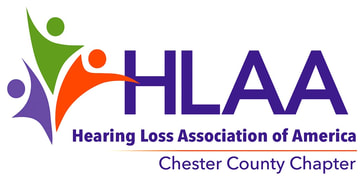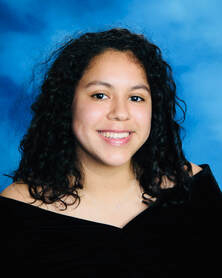- Home
- About
-
RESOURCES
- Books and More
- Assistive Listening Device information & websites >
- Best Practices Questions
- OTC Hearing Aids information!
- Mortimer Bauer Scholarship Information >
- Coronavirus and Hospitalization
- HLAA 2019 Convention reports!
- Closed Captions at the Movies
- Volumetrics - Hearing Pollution
- WCU Speech & Hearing Clinic
- Hearing loop
- National Institute on Deafness and Other Communication Disorders
- Tax Breaks from Uncle Sam
- Hearing Loss Southeastern PA
- dB Exposure Limits Chart NIOSH
- Theaters with Assisted Listening
- Help4Hearing / Hearing Aid Project
-
Photo Gallery
- Newsletter Archives
- Meeting & Events
- Contact
- Donations
- SE-PA 2024 Conference info
Jennifer Castillo
November 23, 2020
My Journey as Trilingual Deaf Student
Working twice as hard as everyone can be overwhelming, especially if you are like me. Everyone has their own unique background; but mine isn't as simple as most. I am Mexican-American and I am deaf. I was born deaf and raised in a Hispanic household where I struggled to learn Spanish and English with my limited hearing. I first learned English Sign Language then American Sign Language. In my Hispanic household where my parents could not help with my homework, projects, or applying to colleges, I had to learn to be independent from an early age and help my parents translate information in languages I struggled to understand. I do not blame my parents for not helping me, they worked so hard to provide for me and my family. I had to work twice as hard to make my parents proud and make me feel satisfied with my achievements. I will be the first person to go to college in my family. I have been the first person to do many essential things in my family.
My hearing loss currently presents as a bilateral profound sensorineural hearing loss. This means that without amplification, I do not have access to auditory information. When I was five years old, my hearing began to get worse and hearing aids alone were no longer benefiting me. I was recommended to look into cochlear implants. My parents decided that I would have surgery on one ear when I was seven years old. Due to my late access to sound, I’ve learned everything late unlike my peers who began to talk at 2 years old. My implant was successful, and I was able to make my way through life and school, catching up and determined to always do my best. Throughout school I needed many accommodations to be successful and access the auditory information in my classrooms. I was pulled out for multiple services including speech therapy and hearing support. During these services I would not only work on my articulation and auditory skills, I also received extensive academic support. Previewing and reviewing classroom material helped me hear, understand, and learn. I was always being pulled out of class, the center of attention, and missing fun activities. I felt like an outcast, but I know how hard I worked and how far I came.
A decade later I was faced with the decision to get a second cochlear implant on my own. After much deliberation I decided to get the surgery because I wanted to experience how it worked. I had no memories of my previous experience with my first cochlear implant surgery. Having one cochlear implant was adequate, but I have learned to never settle and always push myself further. My goal was to influence the younger generation so they know that they can achieve anything. I was inspired by my two younger cousins who happen to both have cochlear implants. I may have cochlear implants on me, but it does not mean I do not want to be deaf. I still identify myself as being Deaf and am proud of who I am and what I have accomplished.
In my world, I see both perspectives on how things work. In the hearing world, people should not treat those with hearing loss differently. They should also learn sign language like other foreign languages in high school to spread awareness and help others in the world. In the deaf world, we struggle to communicate with the rest of society. We have limited opportunities because people do not think we are capable of doing anything. Many hearing people think we cannot do normal things. I can do normal things, it's just that I cannot hear on my own. I work two jobs, I am captain of the track & field team at my high school, I teach an ASL club, and do well in school. Having hearing loss has been an obstacle in my life, but an obstacle that I have overcome and will continue to overcome. It has not kept me from accomplishing my goals and I want others with hearing loss to know that there is nothing that can stop us.
November 23, 2020
My Journey as Trilingual Deaf Student
Working twice as hard as everyone can be overwhelming, especially if you are like me. Everyone has their own unique background; but mine isn't as simple as most. I am Mexican-American and I am deaf. I was born deaf and raised in a Hispanic household where I struggled to learn Spanish and English with my limited hearing. I first learned English Sign Language then American Sign Language. In my Hispanic household where my parents could not help with my homework, projects, or applying to colleges, I had to learn to be independent from an early age and help my parents translate information in languages I struggled to understand. I do not blame my parents for not helping me, they worked so hard to provide for me and my family. I had to work twice as hard to make my parents proud and make me feel satisfied with my achievements. I will be the first person to go to college in my family. I have been the first person to do many essential things in my family.
My hearing loss currently presents as a bilateral profound sensorineural hearing loss. This means that without amplification, I do not have access to auditory information. When I was five years old, my hearing began to get worse and hearing aids alone were no longer benefiting me. I was recommended to look into cochlear implants. My parents decided that I would have surgery on one ear when I was seven years old. Due to my late access to sound, I’ve learned everything late unlike my peers who began to talk at 2 years old. My implant was successful, and I was able to make my way through life and school, catching up and determined to always do my best. Throughout school I needed many accommodations to be successful and access the auditory information in my classrooms. I was pulled out for multiple services including speech therapy and hearing support. During these services I would not only work on my articulation and auditory skills, I also received extensive academic support. Previewing and reviewing classroom material helped me hear, understand, and learn. I was always being pulled out of class, the center of attention, and missing fun activities. I felt like an outcast, but I know how hard I worked and how far I came.
A decade later I was faced with the decision to get a second cochlear implant on my own. After much deliberation I decided to get the surgery because I wanted to experience how it worked. I had no memories of my previous experience with my first cochlear implant surgery. Having one cochlear implant was adequate, but I have learned to never settle and always push myself further. My goal was to influence the younger generation so they know that they can achieve anything. I was inspired by my two younger cousins who happen to both have cochlear implants. I may have cochlear implants on me, but it does not mean I do not want to be deaf. I still identify myself as being Deaf and am proud of who I am and what I have accomplished.
In my world, I see both perspectives on how things work. In the hearing world, people should not treat those with hearing loss differently. They should also learn sign language like other foreign languages in high school to spread awareness and help others in the world. In the deaf world, we struggle to communicate with the rest of society. We have limited opportunities because people do not think we are capable of doing anything. Many hearing people think we cannot do normal things. I can do normal things, it's just that I cannot hear on my own. I work two jobs, I am captain of the track & field team at my high school, I teach an ASL club, and do well in school. Having hearing loss has been an obstacle in my life, but an obstacle that I have overcome and will continue to overcome. It has not kept me from accomplishing my goals and I want others with hearing loss to know that there is nothing that can stop us.
- Home
- About
-
RESOURCES
- Books and More
- Assistive Listening Device information & websites >
- Best Practices Questions
- OTC Hearing Aids information!
- Mortimer Bauer Scholarship Information >
- Coronavirus and Hospitalization
- HLAA 2019 Convention reports!
- Closed Captions at the Movies
- Volumetrics - Hearing Pollution
- WCU Speech & Hearing Clinic
- Hearing loop
- National Institute on Deafness and Other Communication Disorders
- Tax Breaks from Uncle Sam
- Hearing Loss Southeastern PA
- dB Exposure Limits Chart NIOSH
- Theaters with Assisted Listening
- Help4Hearing / Hearing Aid Project
-
Photo Gallery
- Newsletter Archives
- Meeting & Events
- Contact
- Donations
- SE-PA 2024 Conference info

